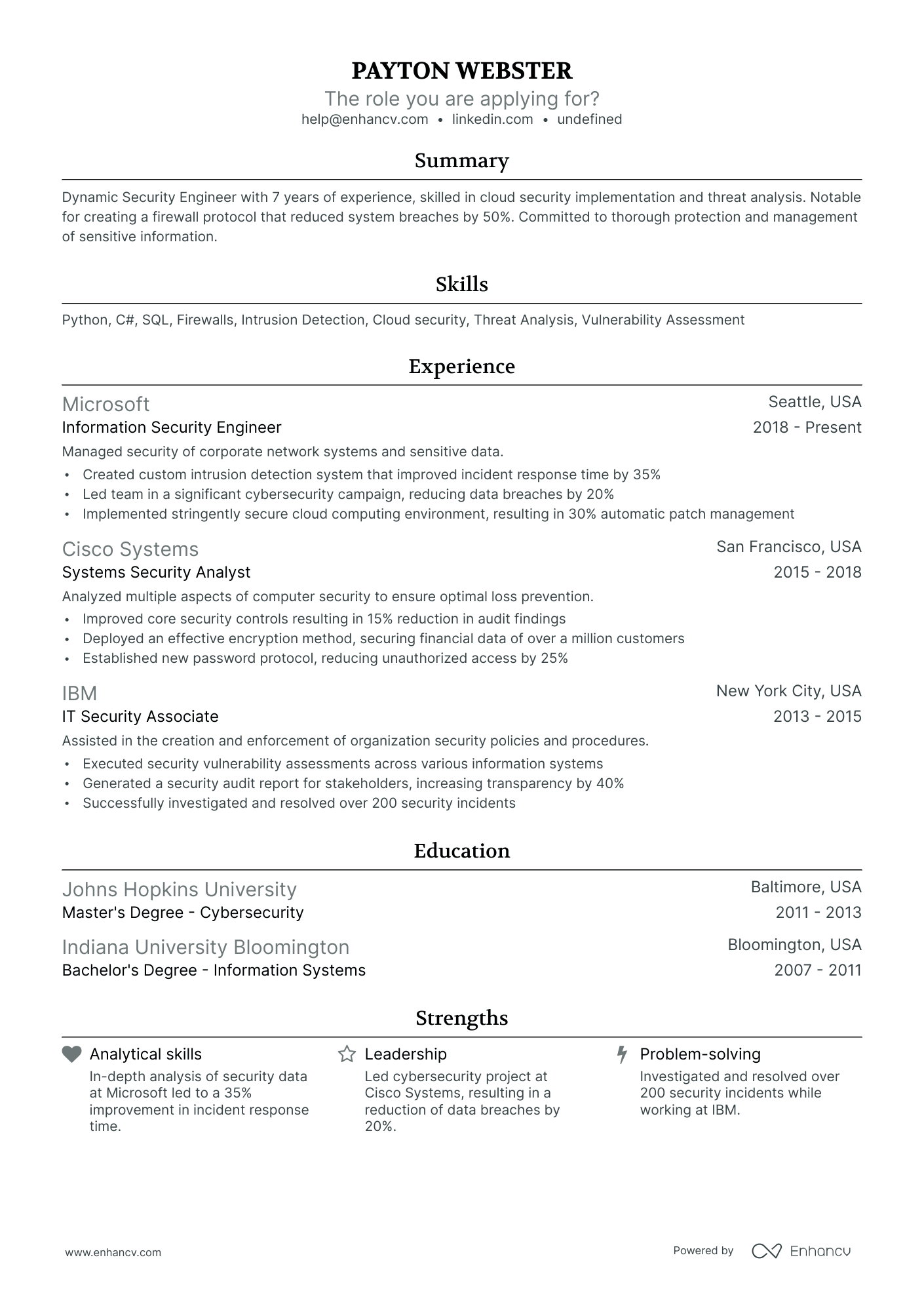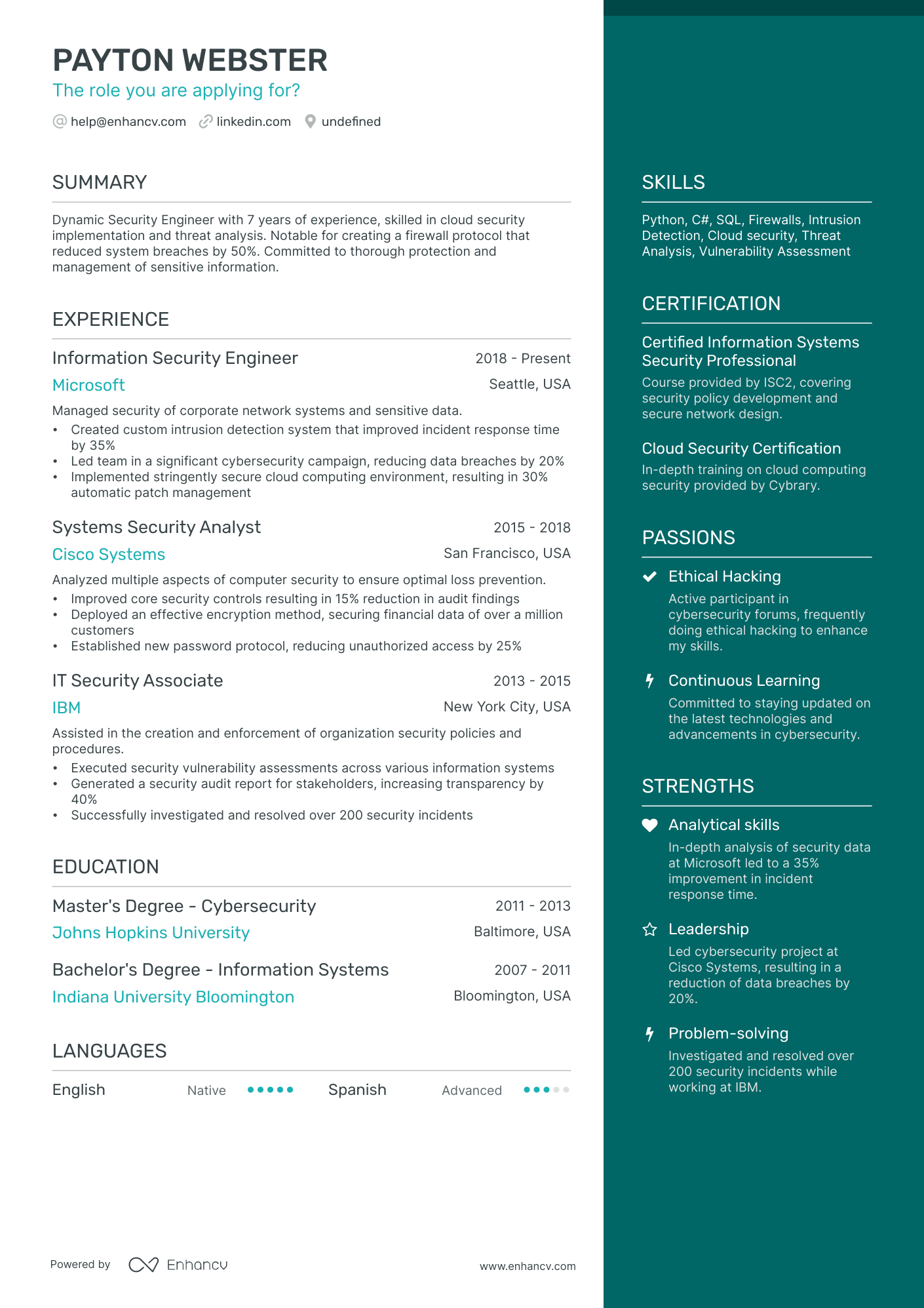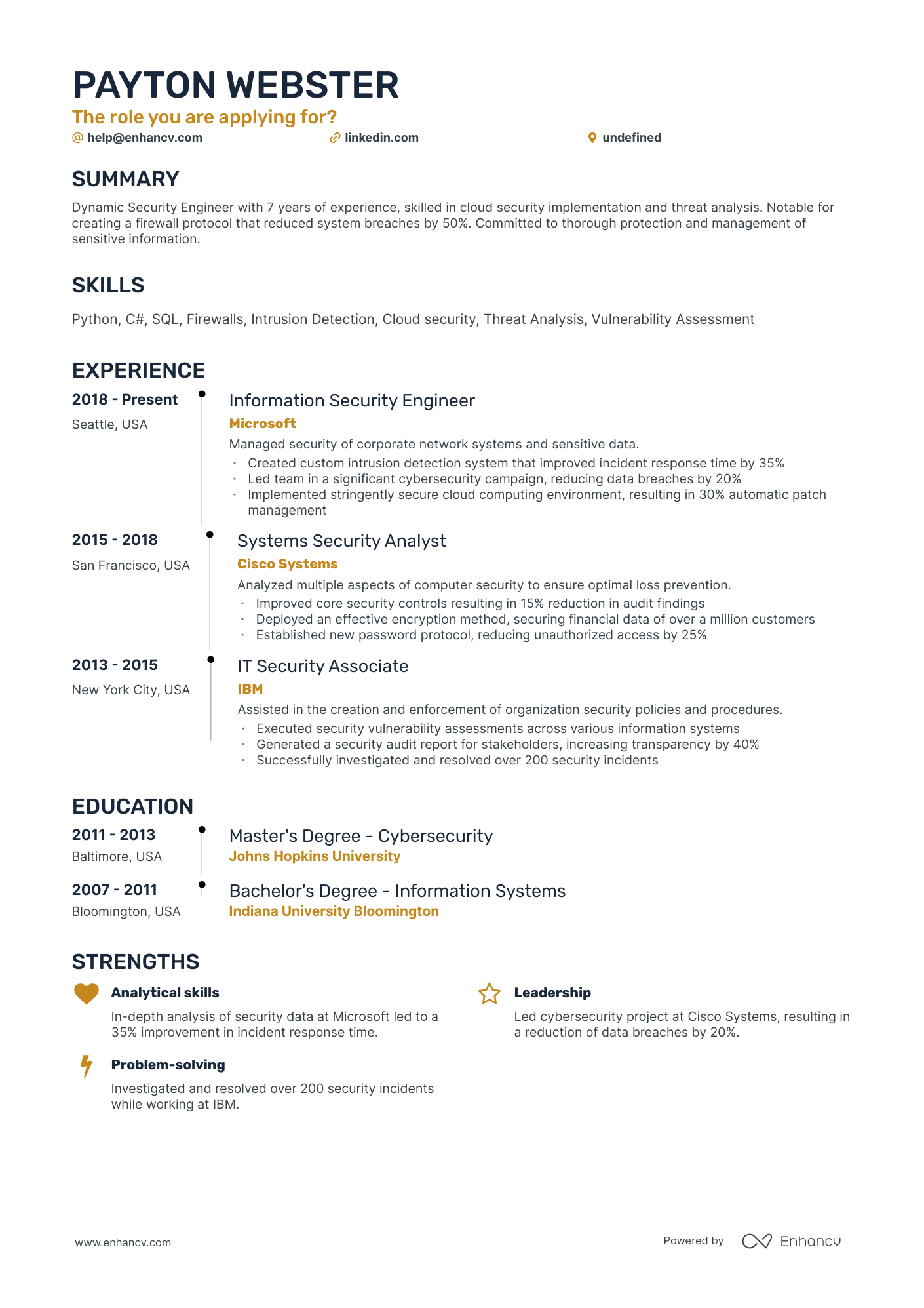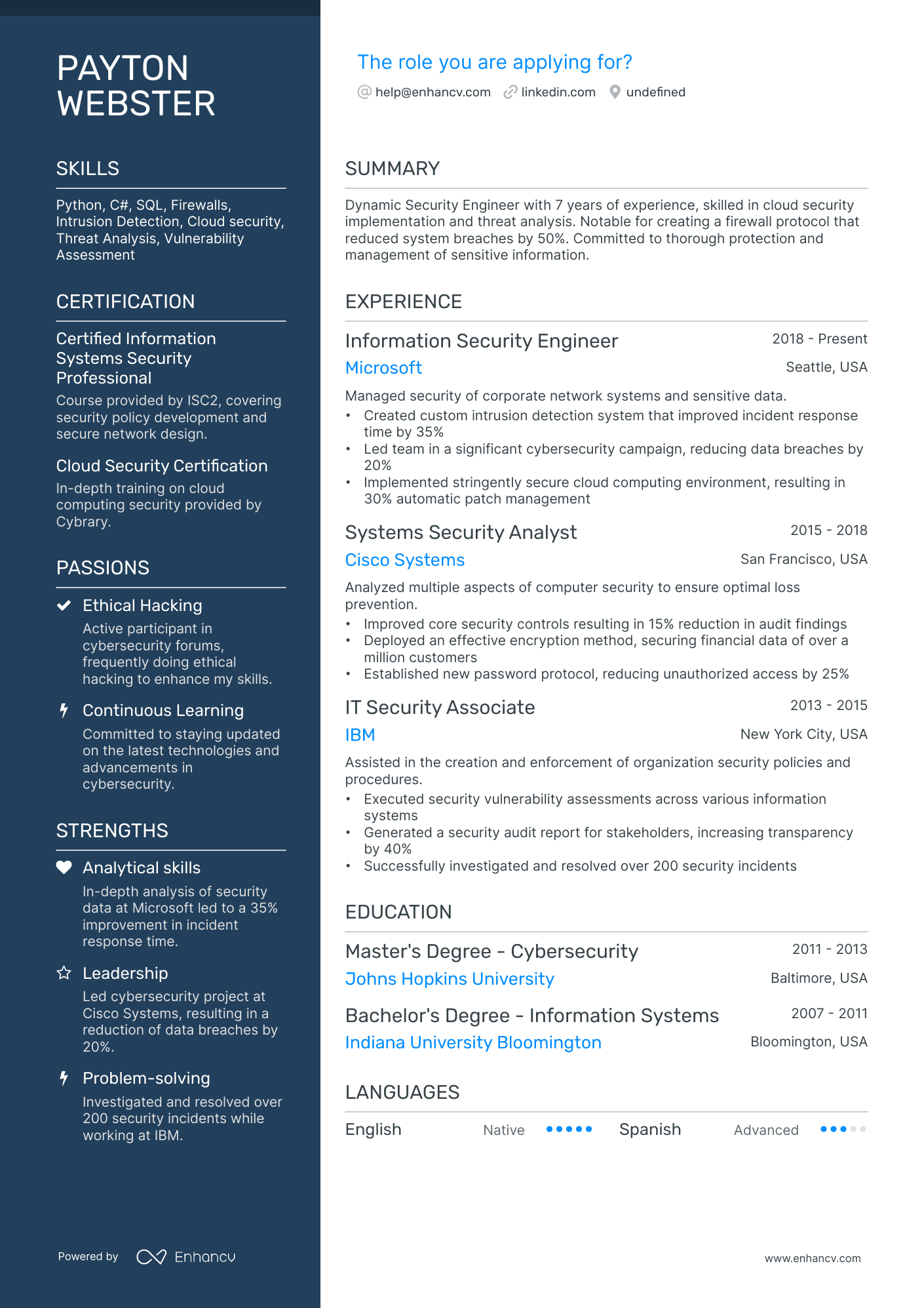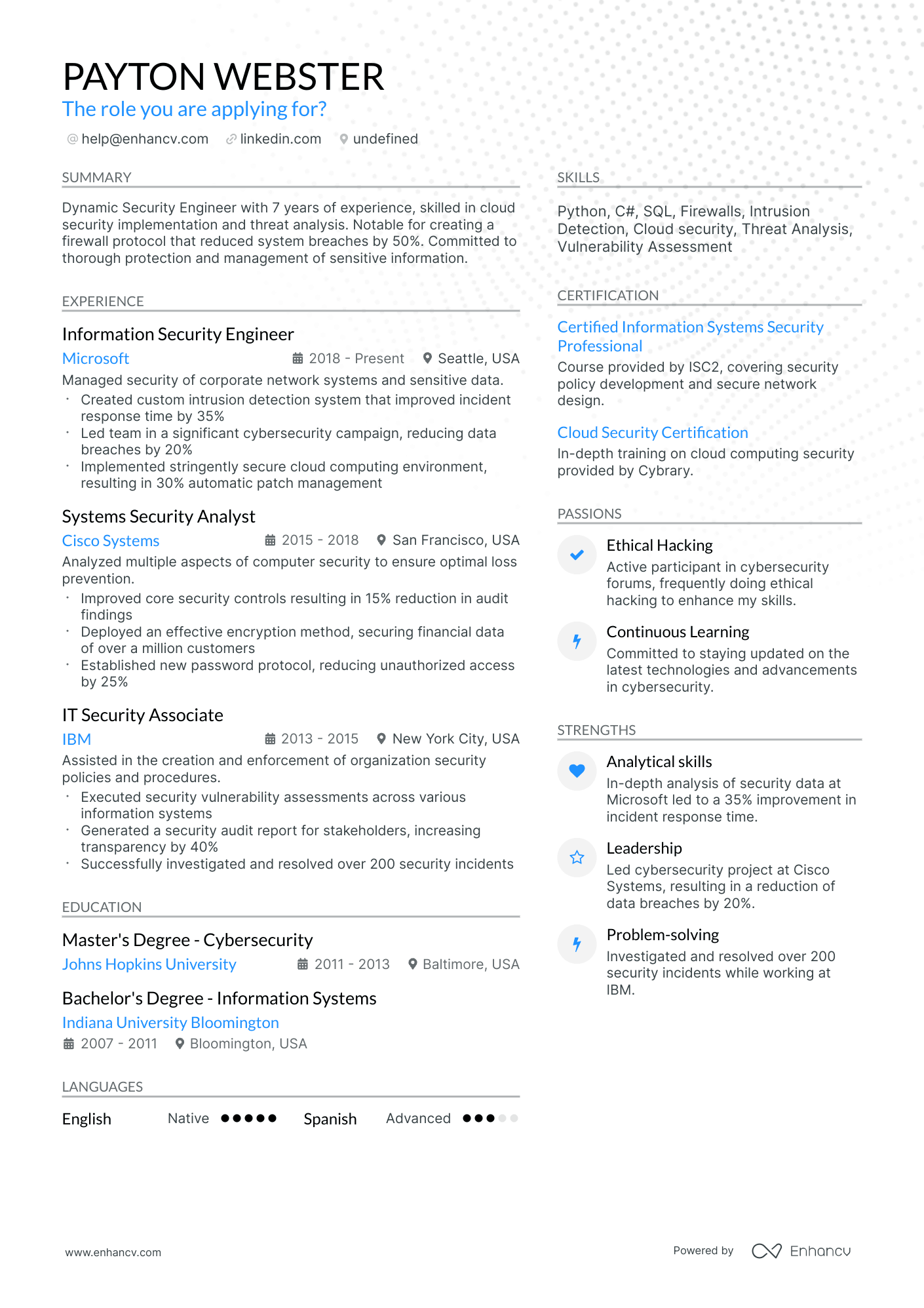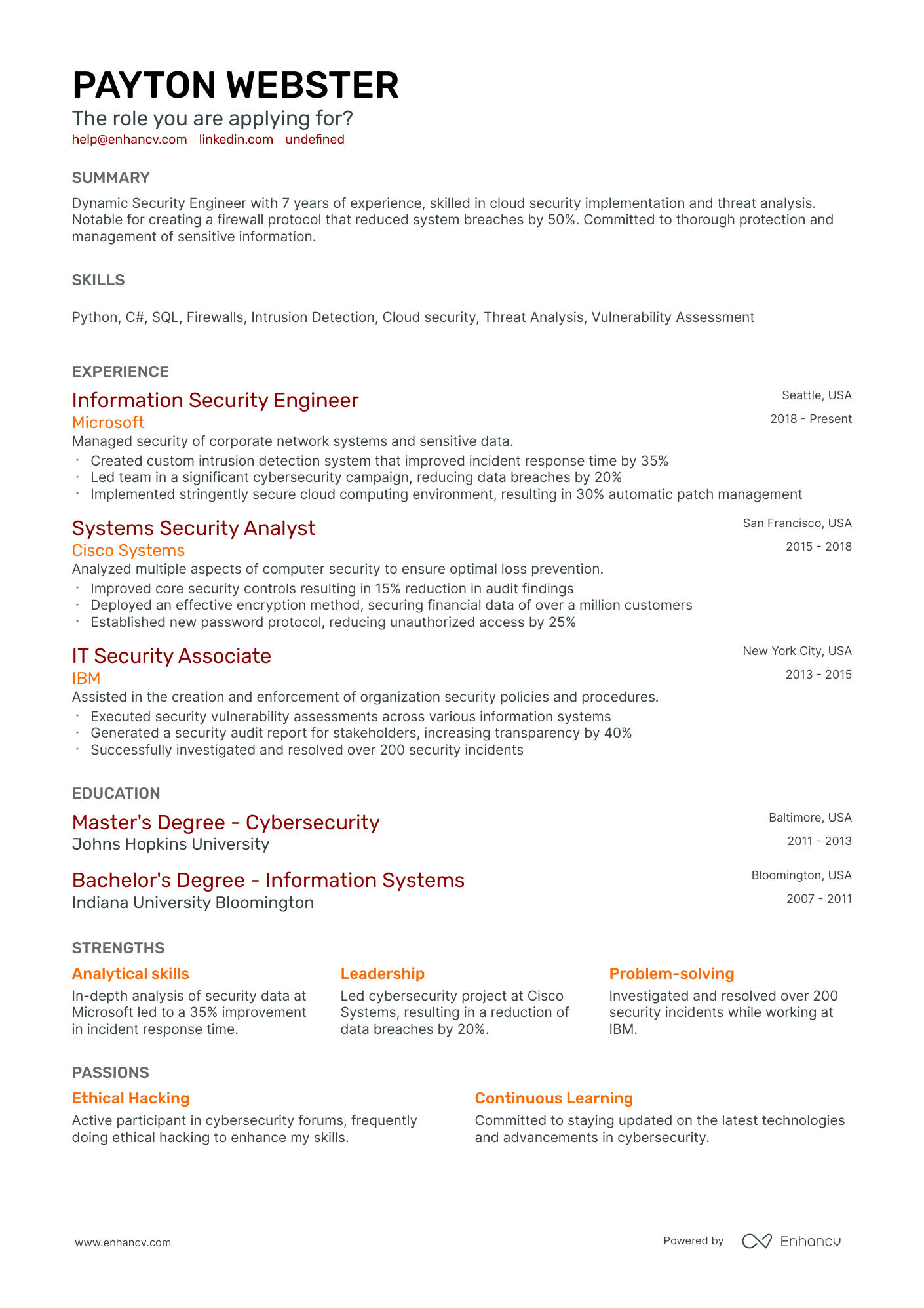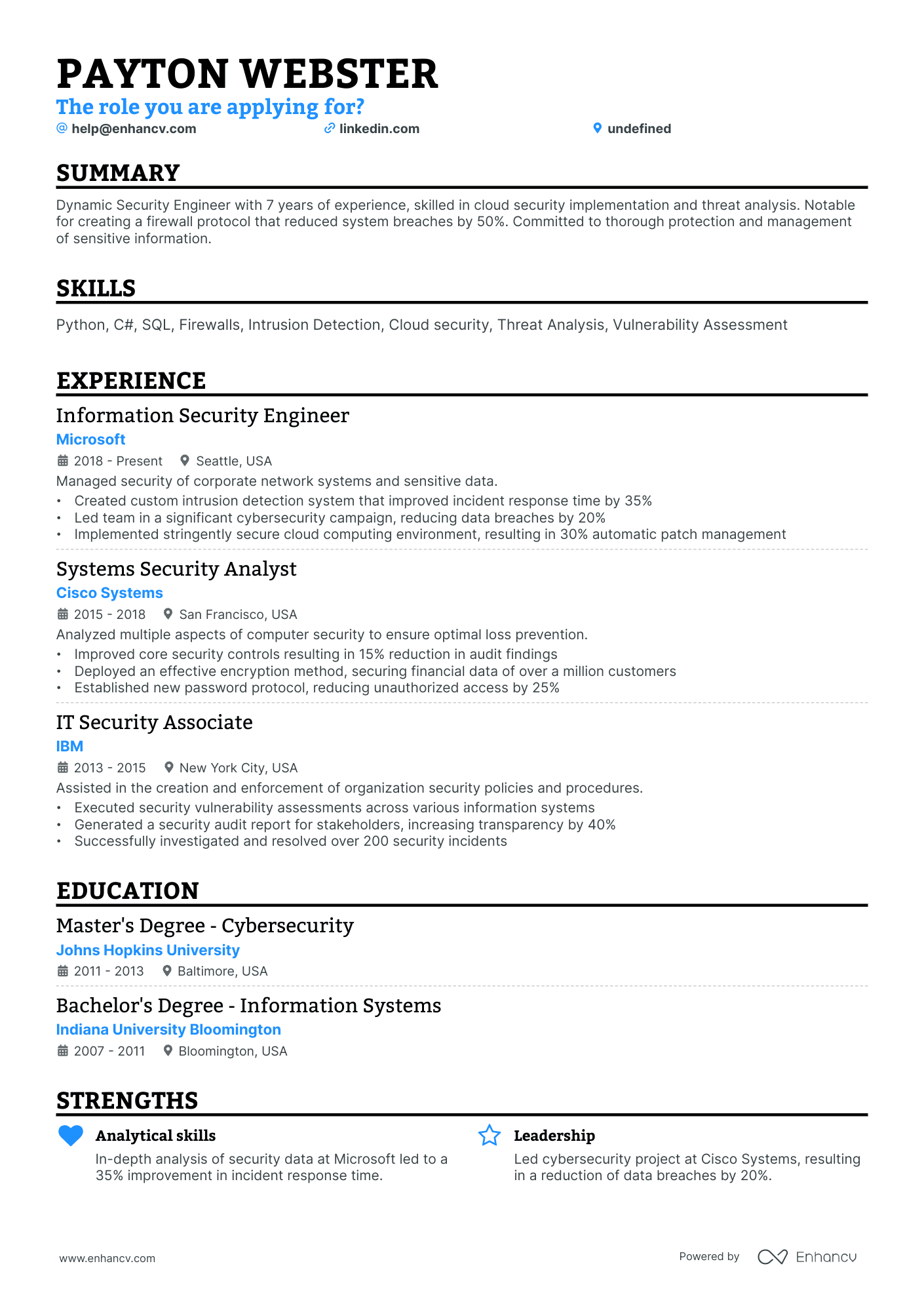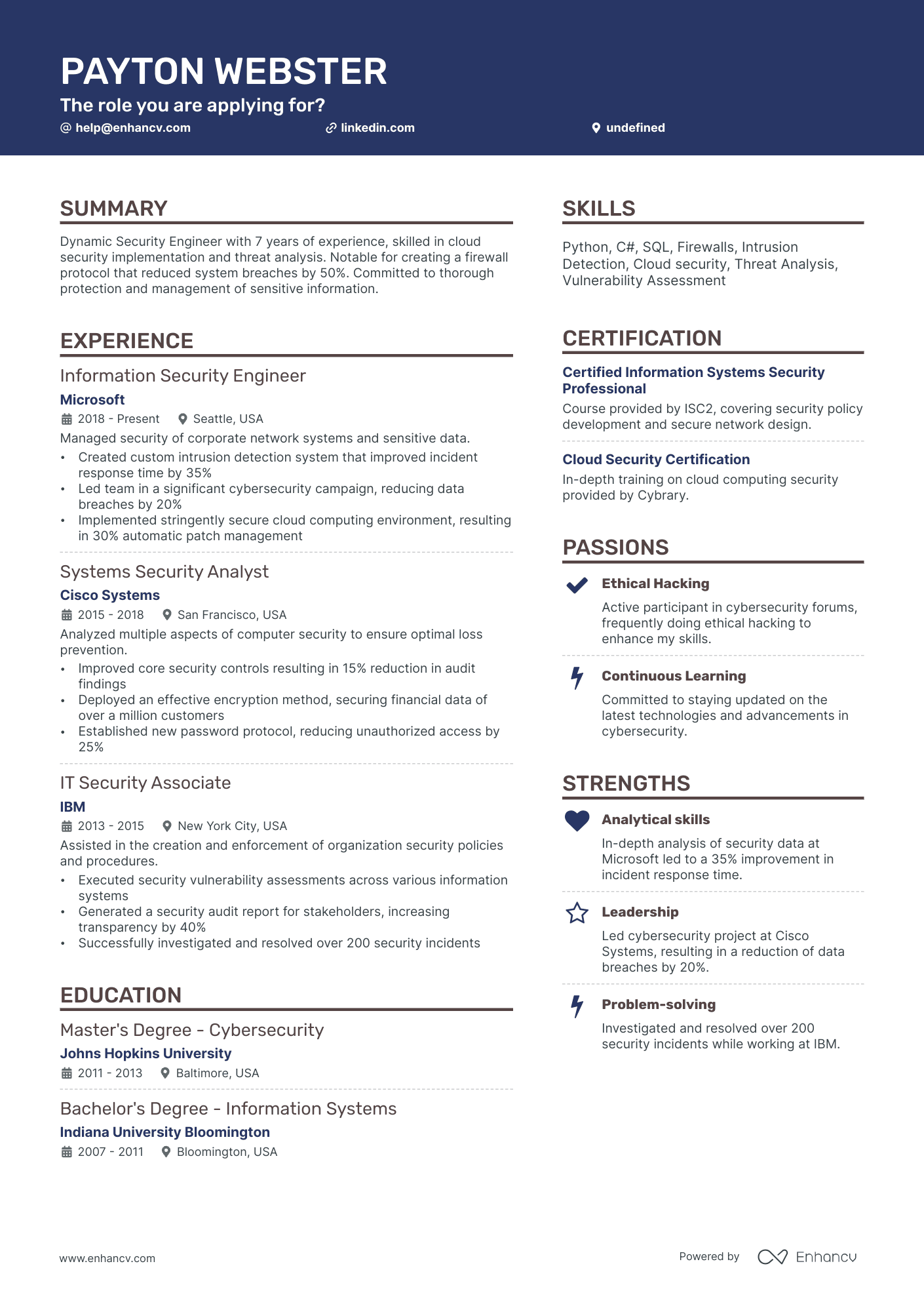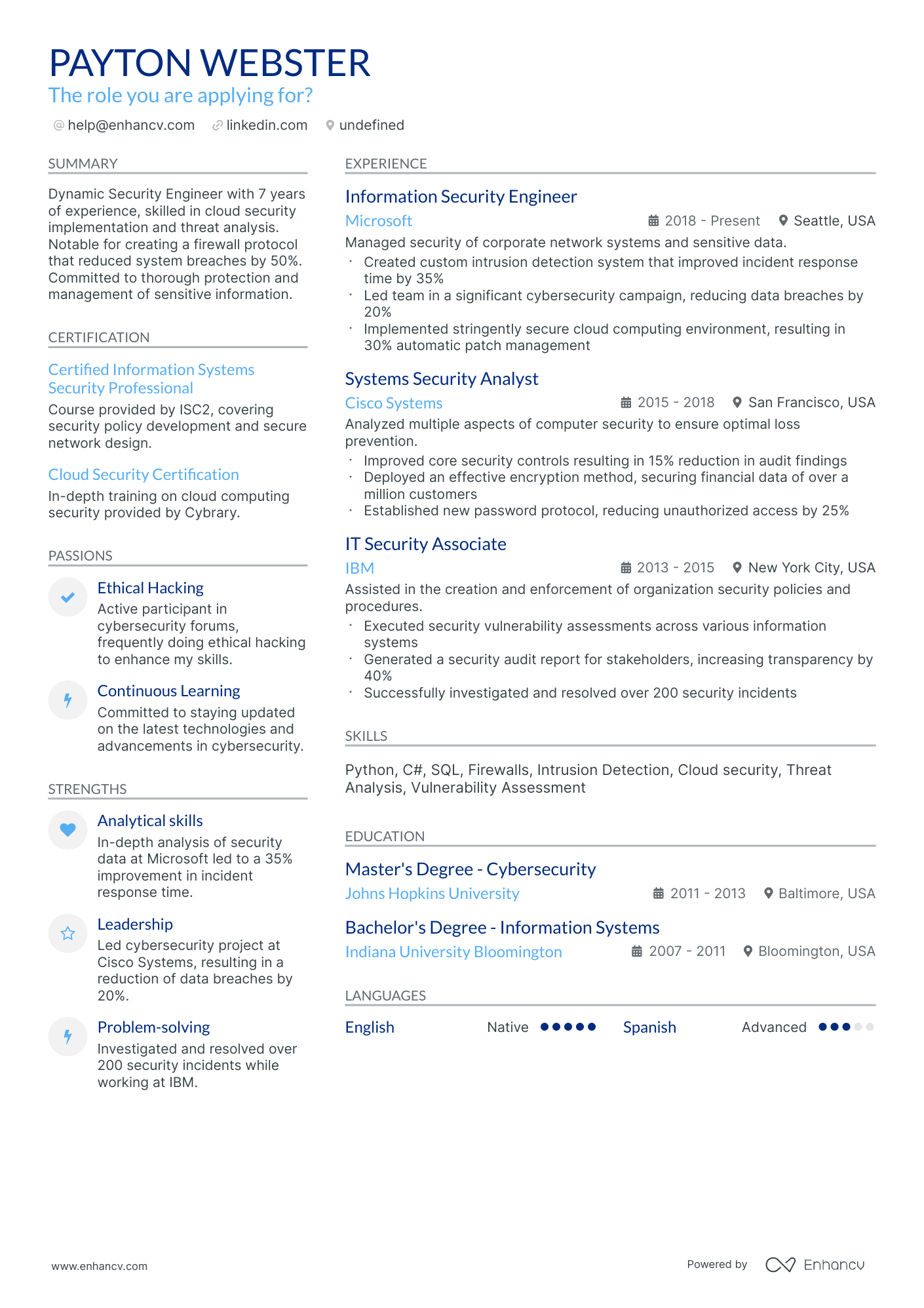One primary challenge for information security engineers when crafting their resumes is effectively demonstrating their technical expertise in a way that aligns with the specific security needs and compliance standards of potential employers. Our guide can assist by providing industry-specific keywords and templates that highlight relevant skills, projects, and experiences, while also educating job seekers on how to tailor their resume to meet the unique requirements and expectations of each prospective employer in the field of information security.
Dive into this guide to learn how to craft a information security engineer resume that offers recruiters a clear view of your career journey:
- Draw from our information security engineer resume samples, highlighting top skills, certifications, and more.
- Illuminate the potential impact you can bring to an organization through your resume summary and experience.
- Spotlight your unique information security engineer expertise, emphasizing tangible results and standout achievements.
Recommended reads:
Tips for refining your information security engineer resume format
The resume format sets the stage for your professional narrative. Ensure it:
- Adopts the reverse-chronological format, placing your most recent experiences at the forefront. This format is ideal for those with relevant and up-to-date experience.
- Features a clear headline, making it straightforward for recruiters to access your contact details, portfolio, or current role.
- Stays concise, ideally spanning no more than two pages, focusing on relevant experiences and skills.
- Maintains its layout by being saved as a PDF, ensuring compatibility with Applicant Tracking Systems (ATS).
Different markets have specific resume styles – a Canadian resume, for instance, may require a different approach.
Upload your resume
Drop your resume here or choose a file. PDF & DOCX only. Max 2MB file size.
Pro tip
While color can enhance your information security engineer resume by emphasizing key details like headlines, job titles, and degrees, moderation is key. Stick to a primary and a secondary color to maintain professionalism and avoid a cluttered appearance.
Key sections to include in your information security engineer resume are:
- The header - with your contact details (like email and phone number), a link to your portfolio, and a headline.
- The summary (or objective) - highlighting the high points of your career so far.
- The experience section - limit yourself to six bullets per role to focus on specific results.
- The skills list - offering a balanced mix of your personal and professional talents.
- Education and certification - displaying your most relevant degrees and certificates for the information security engineer role.
What recruiters want to see on your resume:
- Deep understanding of various information security frameworks such as ISO 27001, NIST, and CIS.
- Hands-on experience with security systems like firewalls, intrusion detection systems, anti-virus software, and authentication systems.
- Proficiency in programming languages relevant to the field like Python, Java, or C++ and knowledge about secure coding practices.
- Clear demonstration of problem-solving skills and the ability to handle security incidents, including detection, investigation, response, and recovery.
- Certifications specific to the role, like Certified Information Systems Security Professional (CISSP), Certified Information Security Manager (CISM), or Certified Ethical Hacker (CEH).
Recommended reads:
Decoding the information security engineer resume experience section
Once you've settled on your resume's format, the next step is detailing your professional journey.
Many information security engineer professionals grapple with this section, especially when balancing between extensive or limited experience. Here's a roadmap to navigate this:
- Limit bullet points under each job role to six, focusing on high-impact contributions.
- Highlight achievements that resonate with the job's requirements, rather than just listing duties.
- Detail any on-the-job certifications or skills acquired and their relevance to your growth.
- Choose impactful verbs for each bullet, avoiding overused terms like "managed".
- Infuse relevant keywords from the job posting, especially in the context of accomplishments.
For more insights, explore these curated examples from seasoned information security engineer professionals:
- Implemented network security measures resulting in a 30% decrease in cybersecurity incidents.
- Developed and executed vulnerability assessments to identify and mitigate potential risks.
- Collaborated with cross-functional teams to implement secure coding practices in software development projects.
- Managed the installation and configuration of firewalls, intrusion detection systems, and VPN solutions.
- Conducted regular security audits and penetration testing to ensure the integrity of the IT infrastructure.
- Led incident response efforts, minimizing downtime and mitigating the impact of security breaches.
- Provided training and mentoring to junior team members on information security best practices.
- Designed and implemented a company-wide data loss prevention (DLP) strategy, resulting in a 60% reduction in data leakage incidents.
- Developed and maintained security policies, standards, and procedures aligned with industry best practices.
- Performed security risk assessments and gap analysis, recommending and implementing security controls.
- Collaborated with IT teams to ensure secure configurations of servers, databases, and network devices.
- Managed the deployment of security monitoring tools, enhancing threat detection and incident response capabilities.
- Participated in the planning and execution of disaster recovery and business continuity exercises.
- Assisted in the investigation and resolution of high-profile security incidents.
- Led the implementation of a SIEM solution, resulting in improved real-time threat detection and incident response.
- Conducted advanced malware analysis and reverse engineering to identify new attack vectors.
- Managed security incidents from initial detection to resolution, minimizing the impact on business operations.
- Evaluated and selected security technologies and vendors based on cost-effectiveness and performance.
- Developed and delivered security awareness training programs for employees at all levels of the organization.
- Collaborated with external auditors to ensure compliance with regulatory requirements.
- Performed regular internal network and application penetration testing.
- Architected and implemented a secure cloud infrastructure, ensuring compliance with industry standards.
- Developed and maintained secure SDLC processes, integrating security into the software development lifecycle.
- Led the deployment of identity and access management (IAM) solutions, enhancing user authentication controls.
- Conducted regular security assessments of third-party vendors and suppliers.
- Managed security incidents and conducted forensic investigations to determine the root cause and prevent future occurrences.
- Participated in red team exercises to evaluate the effectiveness of existing security controls.
- Mentored junior security engineers and provided guidance on complex security issues.
- Implemented a Security Information and Event Management (SIEM) system, enabling centralized log monitoring and analysis.
- Developed and executed incident response plans, minimizing the impact of security breaches.
- Conducted security assessments and developed risk mitigation strategies.
- Collaborated with cross-functional teams to implement secure coding practices in web application development.
- Led the design and implementation of network segmentation to enhance network security.
- Performed regular vulnerability assessments and penetration testing to identify and address potential weaknesses.
- Played a key role in achieving ISO 27001 certification for information security.
- Developed and implemented security monitoring and incident response procedures, reducing incident resolution time by 40%.
- Designed and executed security awareness training programs for employees, fostering a culture of security awareness.
- Conducted security assessments of IT systems and applications, identifying vulnerabilities and recommending remediation measures.
- Managed the deployment and configuration of intrusion prevention systems (IPS) and data encryption technologies.
- Collaborated with external partners to ensure secure data exchange and compliance with privacy regulations.
- Performed threat modeling and risk assessments for new projects and systems.
- Participated in security incident investigations and provided recommendations for preventing similar incidents in the future.
- Implemented security controls and configurations on network devices and servers, reducing the attack surface.
- Developed and maintained security policies and procedures in alignment with industry standards.
- Conducted vulnerability assessments and penetration testing to identify and remediate security weaknesses.
- Managed security incidents and supported forensic investigations to determine the root cause.
- Collaborated with development teams to ensure secure coding practices in web and mobile applications.
- Performed risk assessments and evaluated the effectiveness of existing security controls.
- Provided guidance and support to junior team members on security-related matters.
- Implemented a Security Operations Center (SOC), enhancing real-time threat detection capabilities.
- Developed and documented incident response procedures, enabling efficient handling of security incidents.
- Conducted security audits and compliance assessments to ensure adherence to regulatory requirements.
- Collaborated with IT teams to implement secure network architectures and access controls.
- Managed the administration and tuning of security monitoring tools, ensuring optimal performance.
- Performed log analysis and correlation to identify potential security incidents.
- Assisted in the planning and execution of tabletop exercises to test incident response plans.
- Designed and implemented a comprehensive vulnerability management program, reducing the time to remediate vulnerabilities by 50%.
- Developed and delivered security awareness training for employees, contractors, and executives.
- Conducted security risk assessments and developed mitigation strategies.
- Collaborated with software development teams to integrate security into the SDLC.
- Managed the configuration and maintenance of intrusion prevention systems (IPS) and firewall appliances.
- Performed regular security assessments and penetration testing of external-facing systems.
- Led incident response efforts, coordinating with stakeholders to minimize the impact of security incidents.
- Developed and implemented a Security Incident Response Plan (SIRP), improving incident handling efficiency by 30%.
- Conducted vulnerability assessments and penetration testing to identify and remediate security vulnerabilities.
- Collaborated with development teams to ensure secure coding practices in web applications.
- Managed the installation and configuration of network security devices, including firewalls and VPNs.
- Performed security log analysis and monitoring using SIEM tools to detect and respond to potential threats.
- Participated in security audits and compliance assessments, addressing findings and implementing corrective actions.
- Provided guidance and support to junior security engineers on security incident response procedures.
The following content includes information from "O*NET OnLine" by the U.S. Department of Labor, Employment and Training Administration (USDOL/ETA). Used under the CC BY 4.0 license. The data represents the top responsibilities present on the task lists for information security engineer professionals.
Top Responsibilities for Information Security Engineer:
- Assess the quality of security controls, using performance indicators.
- Conduct investigations of information security breaches to identify vulnerabilities and evaluate the damage.
- Coordinate documentation of computer security or emergency measure policies, procedures, or tests.
- Coordinate monitoring of networks or systems for security breaches or intrusions.
- Coordinate vulnerability assessments or analysis of information security systems.
- Develop information security standards and best practices.
- Develop or implement software tools to assist in the detection, prevention, and analysis of security threats.
- Develop or install software, such as firewalls and data encryption programs, to protect sensitive information.
- Develop response and recovery strategies for security breaches.
- Identify or implement solutions to information security problems.
Quantifying impact on your resume
<ul>
No experience, no problem: writing your information security engineer resume
You're set on the information security engineer role of your dreams. Yet, you have little to no work experience . Here's how you can curate your resume to substitute your lack of experience:
- Don't list every single role you've had so far, but focus on the ones that align with the job you're applying for
- Include any valid experience in the field - whether it's a university research project, or a summer internship
- Highlight the soft skills you're bringing along - those that will have an added value to your application.
- Focus on your education and certifications, especially if they make sense for the role.
Pro tip
Boost your resume by focusing on the practical aspects of each job requirement. While it's good to have job-related keywords on your resume, ensure they're backed by action verbs and quantifiable data. This gives recruiters a clear picture of your information security engineer professional journey.
Highlighting your hard and soft skills on your information security engineer resume
The skills section of your information security engineer resume should showcase your capabilities that align with job requirements.
Your hard skills, or technical skills, demonstrate your proficiency with technological innovations and specific software. On the other hand, your soft skills illustrate how you'd excel in the workplace environment with personal attributes like resilience, negotiation, and organization.
For a well-rounded information security engineer resume, it's essential to include both. Here's how to craft a standout skills section:
- Prioritize skills listed at the top of the job advert.
- Highlight unique skills you've honed over time.
- Choose soft skills that resonate with the company or department culture.
- Address essential job requirements by listing key skills for the information security engineer role that haven't been mentioned elsewhere in your resume.
Check out our sample skill list for information security engineer to get ideas on the most sought-after hard and soft skills in the industry.
Top skills for your information security engineer resume:
Firewalls
Intrusion Detection Systems (IDS)
Security Information and Event Management (SIEM)
Vulnerability Assessment Tools
Encryption Technologies
Endpoint Protection
Network Security Protocols
Penetration Testing
Incident Response Tools
Cloud Security Solutions
Problem Solving
Attention to Detail
Communication Skills
Analytical Thinking
Team Collaboration
Adaptability
Time Management
Critical Thinking
Project Management
Risk Assessment
Next, you will find information on the top technologies for information security engineer professonals from "O*NET OnLine" by the U.S. Department of Labor, Employment and Training Administration (USDOL/ETA). Used under the CC BY 4.0 license.
Top technologies for Information Security Engineer’s resume:
- Apple iOS
- Microsoft Windows Server
- Microsoft SharePoint
- Microsoft Teams
- Go
- Microsoft PowerShell
Pro tip
If the job emphasizes team or organizational culture, dedicate a section of your resume to underscore your strengths and achievements. Top-tier information security engineer candidates also highlight their alignment with a company's values and culture.
how to properly list your resume's education and certifications
Don't underestimate the importance of your resume education section , as it oftentimes helps you further tailor your resume to the job ad.
When writing your education section:
- Include the most relevant degree you have with information about the institution and dates of start and completion;
- If you're in the process of obtaining your degree, include your expected graduation date;
- Consider leaving off degrees that aren't relevant to the job or industry;
- Add bullet points to show how you gained valuable experience relevant for the job in an academic environment.
When describing your resume certifications , always consider their relevancy to the role.
Use the same format to describe them as you will for your education. If you're wondering what are the best certificates for information security engineer roles, check out the list below.
Best certifications to list on your resume
- Certified Information Systems Auditor (CISA), ISACA
- Certified Information Systems Security Professional (CISSP), (ISC)²
- Certified Information Security Manager (CISM), ISACA
- CompTIA Security+, CompTIA
- Certified Cloud Security Professional (CCSP), (ISC)²
- HealthCare Information Security and Privacy Practitioner (HCISPP), (ISC)²
Pro tip
If you're in the process of obtaining your certificate or degree, list the expected date you're supposed to graduate or be certified.
Recommended reads:
Choosing between a resume summary or objective based on your experience
The relevance of a resume summary or a resume objective for your information security engineer application hinges on your experience.
Both provide a snapshot of your expertise and accomplishments. However:
- A resume objective emphasizes your career aspirations, ideal for candidates looking to balance their experience with future goals.
- A resume summary offers a space to detail your unique value and notable accomplishments, perfect for candidates with a rich career history.
Ensure your introduction aligns with the job description, and if possible, quantify details for a compelling narrative.
Resume summary and objective examples for a information security engineer resume
With 8 years experience in the cyber security sector, I have honed my skills in threat detection and vulnerability assessment. I've been instrumental in creating an intrusion detection system for a Fortune 500 tech company, reducing security breaches by 40%. Proficient in C++, Python, and Linux, with a passion for encryption algorithms and ethical hacking.
Having dedicated 10 years to software development, I am now eager to transfer my robust programming expertise into information security engineering. Master of Java, Javascript, and SQL with a significant project portfolio, I have a proven track record in critical thinking, problem-solving, and meticulous attention to detail.
Devoted network architect for a well-established telecommunications provider over the last 6 years, I have displayed a strong aptitude in handling sensitive data. Proven knowledge of TCP/IP protocols, LAN/WAN architecture, and cloud services, I am enthusiastic about transitioning my skillset to infosec engineering.
A seasoned database administrator excited to transition into the realm of information security. With 7 years managing large-scale Oracle databases, my proficiency lies with SQL, Linux, and PL/SQL. Having developed a resilient backup strategy that saved $1.5 million in potential data recovery costs, I'm ready to tackle new cybersecurity challenges.
As a recent computer science graduate, I am eager to cultivate my passion for cryptography and network security. I aim to leverage my academic knowledge of Python, machine learning, and ethical hacking techniques, all while contributing positively to a team committed to safeguarding digital assets and maintaining the highest levels of confidentiality.
With a freshly minted degree in cybersecurity, I am driven to apply my theoretical understanding of information systems, network protocols, and cryptography in a practical setting. My focus is on utilizing my familiarity with C#, Java, and secure coding practices to contribute to a cybersecurity team dedicated to mitigating risk and enhancing system defenses.
Extra sections to boost your information security engineer resume
Recruiters love candidates who offer more. Share your personality or extra industry credentials. Consider adding:
- Projects showcasing standout work.
- Top awards or recognitions.
- Relevant publications.
- Hobbies and interests that reveal more about you.
Key takeaways
- The format and layout of your information security engineer resume should reflect your career experience;
- Use the resume summary and objective to highlight your most prominent accomplishments;
- Always be specific about your experience and consider what value each bullet adds to your information security engineer application;
- Consider how your academic background and technical capabilities could further showcase your alignment to the role;
- Your soft skills should contribute to your overall information security engineer profile - aligning your personality with your professional self.
